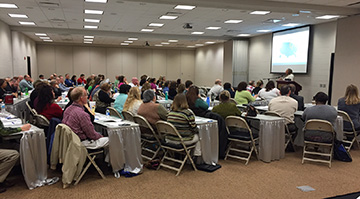Iowa UCEDD Partners with State Agencies on Recidivism Reduction Initiative
April 5, 2016

|
Iowa is one of five states that received a $3 million grant from the U.S. Department of Justice as part of their Second Chance Act Comprehensive Statewide Adult Recidivism Reduction Program. The grant has several areas of focus all centered around the goal of reducing recidivism through systems improvement work.
One of the areas of focus is to improve pre-release planning and connection to the myriad community service providers that will support an individual while they are transitioning back to the community after incarceration. Towards this effort, the Iowa Department of Corrections partnered with the Iowa Department of Human Services to develop a plan for increasing cross-systems collaboration. DHS reached out to Iowa's UCEDD to provide technical assistance towards the development of a training curriculum and to facilitate a series of trainings with the overall goal of developing connections between prisons, community-based corrections, and community service providers. Additional objectives of the training include developing an understanding of the challenges faced by individuals and their families as they reenter the community after incarceration; and learning about how the corrections and community services systems operate, including information about services provided, barriers encountered, and what the various systems see as the keys to successful reentry.
UCEDD staff members Tammie Amsbaugh and Caitlin Owens recently concluded the first round of trainings, which included eight geographically distributed events in February and March, and will conduct two more rounds of trainings this fall and next spring. Over 400 individuals participated in the first round of trainings, with the smallest training group being 28 and the largest 89. Participants included individuals and family members with lived experience with incarceration; community members; staff and supervisors from prisons and community-based corrections; and staff from state and community-based providers of mental health and disability services, substance use disorder treatment, and other supportive services.
The training included a panel of individuals with lived experience sharing their story and answering questions; a panel of corrections and community providers talking about how they support reentry; and a structured discussion that allowed all participants to share more information about their organization, ask questions, and talk about successes and challenges they encounter while supporting individuals who are reentering the community after incarceration. Participants seemed eager to come together with staff from organizations and agencies other than their own, some of which they had never heard of, and some that they may frequently reference or refer to, but not always have a chance to meet with face-to-face. Surveys collected after the trainings indicate a high level of satisfaction among those who responded, as well as thoughtful suggestions for the future trainings.
To supplement the information shared at the trainings, staff created a Resource Guide that provides simple overviews of services and supports addressed during the training, as well as key contact information for making referrals or asking questions. The guide will be available on the Iowa UCEDD website soon.







